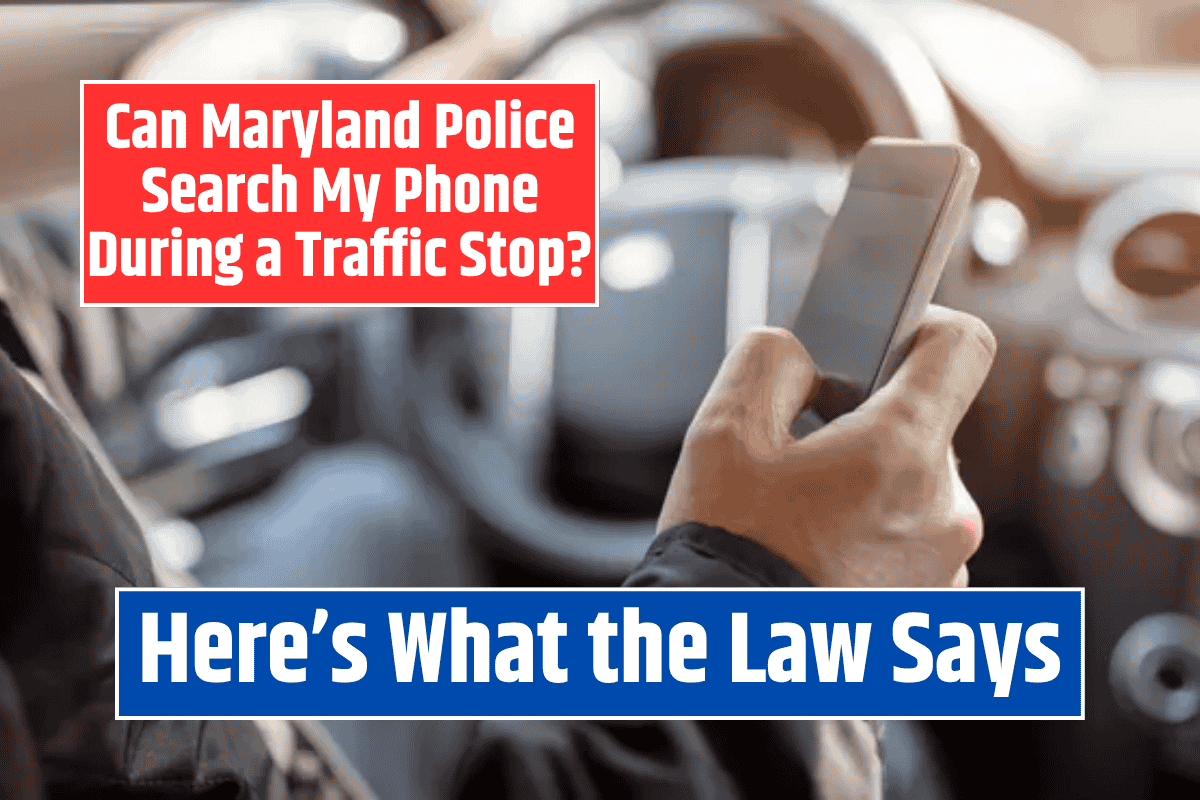Your smartphone holds private details about your life—messages, call history, photos, locations, and more. So, what happens if you’re pulled over in Maryland and the police ask to see your phone? Can they search it without your permission?
The answer is no—not unless specific legal conditions are met. This article explains your rights under Maryland and U.S. law and what to do if you’re asked to unlock or hand over your phone during a traffic stop.
Your Digital Privacy Is Protected by Law
Under the Fourth Amendment of the U.S. Constitution and Maryland law, you are protected from unreasonable searches and seizures.
That means your phone cannot be searched just because an officer pulled you over. Maryland courts have made it clear that a search warrant or your consent is required before police can access your phone’s data.
When Can Maryland Police Legally Search Your Phone?
There are only a few specific situations where a police officer in Maryland can search your phone during or after a traffic stop:
1. You Give Consent
If you say “yes,” you’re giving police permission to access your phone. But this is completely voluntary, and you have every right to say no. If you unlock your phone or hand it over, the court may consider that as you giving consent. To avoid confusion, say clearly and politely:
“I do not consent to a search of my phone.”
2. They Have a Search Warrant
Police can search your phone only if they have a valid warrant signed by a judge. This warrant must be specific, meaning it must describe what kind of data police are allowed to look for. Maryland courts require that search warrants for phones must be limited in scope to what’s relevant to the case.
3. Exigent Circumstances (Emergency Situations)
In rare cases, like an immediate threat to life or a real risk that evidence might be destroyed, police might perform a phone search without a warrant. These situations are known as “exigent circumstances.” However, such cases are rare, and any search done this way must later pass strict review in court.
4. Incident to Arrest? Not Without a Warrant
Even if you’re arrested during the traffic stop, police still need a warrant to go through your phone. This was confirmed by the U.S. Supreme Court in Riley v. California, and Maryland courts have reinforced this protection. Your phone is not like your pockets or your car—it holds far more private data, and the law treats it differently.
Common Misunderstanding: “Phone Use While Driving”
In Maryland, it’s illegal to text while driving, but you can use your phone to make a call as long as it’s hands-free. So if police see you holding your phone, they may pull you over—but that doesn’t give them permission to search your phone.
Courts have ruled that even seeing someone “manipulating” a phone does not count as probable cause to search it.
Can Police Search Your Car and Then Your Phone?
Police may search your vehicle if they have probable cause or your permission, but that doesn’t automatically give them the right to access your phone. Digital content is given stronger legal protection, and police must follow specific rules to access it.
What to Do If Police Ask for Your Phone
If you’re stopped by police in Maryland and they ask to see or search your phone:
Stay calm and respectful.
Ask if they have a warrant.
If they don’t, clearly say: “I do not consent to a search of my phone.”
Do not unlock your phone or share your password.
Avoid arguing, but stand firm.
Ask for a lawyer if they continue to pressure you.
What If Police Search Your Phone Without Permission?
If an officer searches your phone without your consent or a valid warrant, that may be a violation of your rights. In that case, a lawyer can file a motion to suppress the evidence, meaning anything found during the illegal search may not be used against you in court.
In Maryland, your phone is protected by strong digital privacy laws. Police cannot search it during a traffic stop unless you give permission or they have a proper search warrant. Even if you’re arrested, your phone’s contents remain protected.
If your rights are violated and your phone is searched illegally, speak to an attorney right away. Knowing and asserting your rights can help protect your privacy and prevent unlawful searches.
[1] https://www.marylandcriminallawyer-blog.com/what-is-and-is-not-proper-justification-for-a-maryland-traffic-stop-based-on-a-drivers-use-of-cell-phone-while-driving/
[2] https://thedailyrecord.com/2025/05/28/md-supreme-court-cellphone-stop-appeals/
[3] https://www.eff.org/deeplinks/2022/10/new-federal-and-state-court-rulings-show-courts-are-divided-scope-cell-phone












